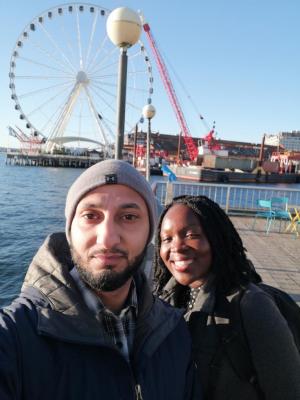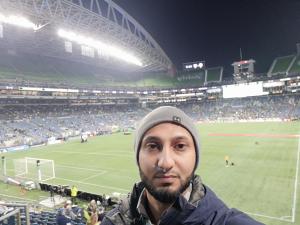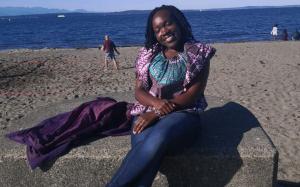
University of Nairobi medical students share their Seattle experiences
Through the Clinical Education Partnership Initiative (CEPI), a month-long program designed for medical residents to gain experience abroad, two University of Nairobi medical students, Abdala Mohamed and Hannah Bosire, spent a month training at UW Medicine hospitals in Seattle.
CEPI, a collaboration between UW and the University of Nairobi, offers opportunities for medical residents to work under the supervision of a UW Internal Medicine Chief Resident.
Under the program, UW medical students based in Seattle have the opportunity to gain global health experience providing care and clinical teaching in a rural, resource-limited setting in Kenya.
Conversely, the program also brings University of Nairobi medical students to gain global health experience through providing care at UW hospitals in Seattle.
Last October, the program brought Mohamed and Bosire from the University of Nairobi to Seattle, where they trained at UW Medicine hospitals, and worked alongside clinicians and attending physicians under the School of Medicine Internal Medicine Residency Program.
Mohamed and Bosire share with us what it was like for them to work in Seattle.
Abdala Mohamed, University of Nairobi

Q: Can you tell us a little about yourself?
I am currently a second-year resident at the University of Nairobi pursuing my Masters of Internal Medicine.
Before going for my postgraduate studies I worked at a small facility in rural, eastern Kenya town called Mwingi with about 120 beds that was mostly run by general practitioners. This town is also my permanent residence, where I was brought up and lived for most of my life. Due to the shortage of consultants in this facility, I intend to go back and offer my services upon graduation.
Q: What was your typical day at UW like?
During my rotation at UW, a typical day would mostly have two to four learning activities. The first one was attending the ward rounds with a team of about five to six clinicians (an attending, residents and medical students) where we would review admitted patients, discuss their case and with the guidance of an attending, come up with the next management plan. Then I would go for the morning report, which was a one-hour academic discussion based on a real scenario mediated by the chief resident. I would then later attend the noon conference, a medical lecture mainly given by a specialist. In the afternoon we would at times have a brief teaching with the team’s attending, depending on how much ward work was pending.
Q: What was the most valuable takeaway as part of CEPI?
By attending the ward rounds, morning reports, and noon conferences, I was able to see medical conditions that I had never seen before, partly being due to limited resources in our facilities. I was also able to appreciate a different dimension of how to interact and manage patients. In addition, these activities were conducted and run by people who were great educators, and attending them made me appreciate how great it feels to be in such a great learning institution with educators who jump at every opportunity they get. We lack such great and willing educators in Kenya. This motivates me to emulate that every time I interact with my juniors.
Q: What was the most interesting/unexpected thing about your time with CEPI?
I was amazed by how helpful and nice people are in Seattle, from those in the streets to staff at the hospital. I was also surprised by the great relationship attendings had with the medical students. They were approachable, very friendly, and always ready to mentor the students. This is a privilege we don’t have in our university as we don’t get guidance on what sources to read, nor do we get that many opportunities of being taught.
Hannah Bosire, University of Nairobi

Q: Can you tell us a little about yourself?
My name is Hannah Moraa Bosire. I’m a third-year resident at the University of Nairobi studying internal medicine. I’m the youngest of four siblings and I reside in Nairobi, the capital city of Kenya. I plan to do my fellowship in nephrology after my residency. I also have a special interest in mentoring and imparting knowledge to junior colleagues, and an interest in going into academia in the future. I enjoy hiking, sightseeing, traveling, and watching movies during my free time. If I wasn't a doctor, I would be a hairdresser!
Q: What was your typical day at UW like?
Getting to do this was an opportunity of a lifetime. It gave me good exposure and I got to experience medicine in a setting flush with resources. The attendings were excellent and I really learned a lot from them. I enjoyed my daily interactions with the residents both at an academic and social level. I got an opportunity to rotate in cardiology, nephrology, and general medicine, with the latter being my favorite. I was able to see some conditions that I had never come across before which was really great. I also enjoyed the morning report sessions. They were very interactive and exciting.
Q: What was the most valuable takeaway as part of CEPI?
I learned strong interpersonal skills from the hospital stuff. Most of the doctors were very humble and kind to each other. They also take time to communicate effectively with patients.
Q: What was the most interesting/unexpected thing about your time with CEPI?
I met a patient from Kenya during one of the long call days at the UW ER! It was a pleasant surprise and nice to catch up on random stuff from back home. I also met a UW resident from Kenya who was really nice. She had us over for dinner and God knows how much I had missed food from home at the time.
The weather was also very interesting. The sun would be out yet I would be freezing! At some point I thought I would get frost bite. I also experienced Halloween...very spooky and creepy I would say. Lastly, Seattle is a very beautiful city and I hope to be back some time in the future.
Author: Catherine Liou, Department of Global Health